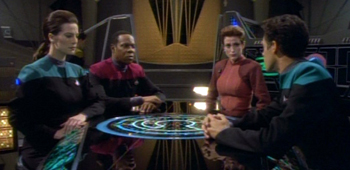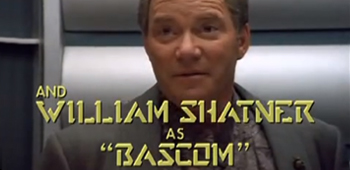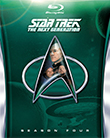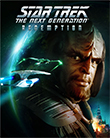We conclude our interview with award-winning writer Morgan Gendel, who contributed scripts for four Star Trek episodes – two for The Next Generation, and two for Deep Space Nine, including the fan favorite story “The Inner Light“. We sat down with Gendel at this April’s Star Trek convention near Philadelphia, part of his cross-country tour, meeting with fans and discuss his contributions to the franchise – he’ll be appearing at the Creation conventions in Chicago and Boston in the next few weeks.
http://www.youtube.com/watch?v=P2WxqUOIBx4
TrekCore: “Starship Mine“. I know these days it’s referred to a lot as a take on “Die Hard” on the Enterprise; the captain running around trying to beat the terrorists. What was your original pitch for that? Was it that sort of storyline, or did you have a different sort of theme in mind for the episode?
Morgan Gendel: My pitch was “Die Hard” on the Enterprise. What I’m proud of in my approach is – in both these episodes – what they have in common is that I approached it from, “What’s a very cool and interesting and fresh tech approach?” I know a lot of people said to me, “Oh, sci-fi, what makes that work is that you just think of a normal human story, and then project it out into the future into a sci-fi world.”
Maybe I’m doing it kind of ass-backwards, but what intrigues me is to think of, like, I thought about it… I had read that – I don’t know if its battleships now, or back in the day – had barnacles attached to the hull, and they had to go and scrape those off. So I thought, well, the same thing would happen to a starship. I did some research, and read about baryon particles – I thought, you know, this is all made-up stuff, so I’m gonna say that traveling at warp speed, every million miles you’d need to have the baryons removed.
I was thinking also of tape degaussing. At the time, a lot of stuff was on video tape and you had to degauss the tapes to reuse them. So I thought it was a similar kind – I put those two ideas together and I thought, well, if you have the ship that has to go through the giant baryon removal process, you probably have to take everybody off the ship – and I got from there to the “Die Hard” thing.
TrekCore: It certainly gives a good ‘ticking clock’ on the story, building to that last-minute rescue.
Morgan Gendel: Sure, you have the green sweep going through.
TrekCore: Around the same time as “Starship Mine”, you also did an episode for Deep Space Nine called “The Passenger” – where Bashir is taken over by this alien criminal, and he’s got this dark side that he doesn’t know about.
Morgan Gendel: Right.
TrekCore: Was that – being so close to the beginning of the series – was it difficult to write for characters that hadn’t really been established yet? I know that when you came on to Next Generation, it was five years into the run, with a very well-established background…
Morgan Gendel: Right. What they do on Star Trek that they don’t do on any other show is they give you a bible yay-thick, with all the stuff about the series and you watch some tapes. They’d probably shot, you know, a pilot and some other stuff, and you just sort of get it. I mean, I didn’t find it particularly daunting or unusual; I think you go in a lot of times… I probably, many cases written backup pilots for series, where they have a pilot, but they want – before they even shoot the pilot – they commission either a second pilot, or episodes of the series as backup. So it’s not an usual thing to do to just hear the showrunner’s take on the characters and get a thumbnail sketch of them and kind of go from there.
 The show’s bible established a foundation for early-series character stories.
The show’s bible established a foundation for early-series character stories.
TrekCore: Moving onto the second season, with “Armageddon Game” – that episode really became the first time O’Brien and Bashir became sort of best friends, through this, you know, bit of a personal disaster they were both fighting through, and that laid the groundwork for essentially the rest of the series. Is that something you went in – going from the beginning – trying to connect these two characters?
Morgan Gendel: No, not at all. Again, I started with a tech idea – and my tech idea was that there was a civilization that had weapons of mass destruction, that – and I can’t remember from my pitch if they had to destroy them – but whatever it was, they hid the blueprints in O’Brien’s DNA. Like, he was the carrier of the blueprints for this thing, he doesn’t know it, and they’re after him.
Michael Piller said, “Oh, I thought what you were going to say is that he has to help them get rid of their weapons of mass destruction, but then they have to kill him because he knows, he’s the last one who knows how they were made.” I said, “Well, that’s what I meant to say!” So that became “Armageddon Game”. But again, it started as a tech thing. I mean, I like working that way, and I think for a Star Trek that’s what they always seemed to need.
As a freelance writer, they seemed to need a fresh kind of tech. They could sit there and spin out the personal stories all day long, they don’t need my help for that. But to come in with a fresh tech idea, I think, was always very useful to them.
TrekCore: The last question I have – I know you’ve also worked in other areas, of course, throughout your career; you ran the recent Dresden Files series on Sci-Fi, and of course you also did the TekWar television movies based on William Shatner’s novels.
Morgan Gendel: I didn’t RUN Dresden Files, what I did was optioned the books and I helped develop them, and then I brought them – I sold them first to Sci-Fi Channel, and then brought it to Lions Gate, so I was involved mainly as an executive producer of that.
 Gendel wrote two of William Shatner’s TekWar television movies.
Gendel wrote two of William Shatner’s TekWar television movies.
I was very involved in the TekWar movies. Now, again, there was no staff – there’s not usually a staff to do a series of movies. So, I was brought on to rewrite maybe the second or third movie, and then I wrote another one…
TrekCore: Did you have much interaction with William Shatner during the production, or during the writing time with those movies?
Morgan Gendel: Bill Shatner called me up on a Sunday, and said, “We’re going to Toronto! Pack your bag!” And I think I left that day! He just decided that they needed to do a bottle show – which, in Hollywood terminology, means a show that’s very contained, and can be below the patterned budget. So, it’s a show you can do kind of cheap to balance out high –
TrekCore: A money-saver.
Morgan Gendel: A money-saver show. So, we kind of worked on the story together. I mean, he didn’t take a story credit, because I still had to write the story, but we bounced around the basic ideas of what turned out to be – I was told – the best movie in the TekWar series of movies. Then he asked me to go on to the series, and I didn’t want to do that… but I was very active, and I was in Toronto during – we were working on this one, so another one was being produced – and that’s how Bill Shatner and I became pretty good friends.
Go to Part: 1 2
![]()
Our thanks to Morgan Gendel for his time. We’ll be continuing our interviews with Star Trek writers in the near future, so stay tuned to TrekCore for more features coming soon!
 | Order Star Trek: The Next Generation Season 4 Blu-ray today! |  | Order TNG - "Redemption" Feature Blu-Ray today! |
|---|
